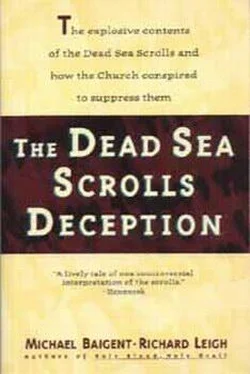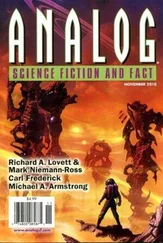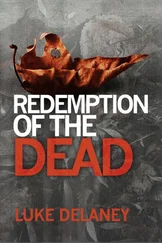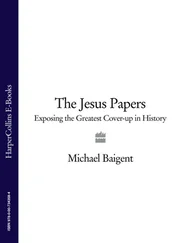You go on to talk blithely about what the first Jewish-Christians thought in Jerusalem, and no one would guess that your only real evidence — if you can call it such — is the New Testament, that body of much worked-over traditions whose ‘evidence’ would not stand for two minutes in a court of law… As for… Jesus as a ‘son of God’ and ‘Messiah’ — I don’t dispute it for a moment; we now know from Qumran that their own Davidic Messiah was reckoned a ‘son of God’, ‘begotten’ of God — but that doesn’t prove the Church’s fantastic claim for Jesus that he was God Himself. There’s no ‘contrast’ in their terminology at all — the contrast is in its interpretation. 38
After everything that had passed, Allegro would have been extremely naive to assume that he could still be accepted by his erstwhile colleagues as a member of their team. Nevertheless, that was precisely what he seems to have done. In the summer of 1957, he returned to Jerusalem and spent July, August and September working on his material in the ‘Scrollery’. From his letters of the time, it is clear that he did indeed feel himself part of the team again and had no doubt that all was well. In the autumn, he travelled back to London and arranged with the BBC to make a television programme on the scrolls. In October, he returned to Jerusalem with producer and film crew. They immediately went to see Awni Dajani, Jordanian curator of the Rockefeller Museum and one of Allegro’s closest friends. The next morning, Dajani took them round ‘to get things moving with de Vaux’. In a letter of 31 October to Frank Cross, whom he still assumed to be his ally, Allegro described the ensuing events:
We foregathered… and explained what we hoped to do, only to be met with a blank refusal by De V. to collaborate in any way. We stared open-mouthed for some time, and then Dajani and the producer started trying to find out what it was all about. The whole thing was a complete knock-out because, as far as I was aware I had left my dear colleagues on the best of terms — or pretty much so. Certainly no bitterness on my side about anything. But De Vaux said that he had called a meeting of ‘his scholars’ and that they had agreed to have nothing to do with anything I had anything to do with! My pal the producer then took the old gent outside and explained in words of one syllable that we were avoiding any controversial matter at all in the program on the religious side, but he (de Vaux) was quite adamant. He said that whereas he could not stop us taking pictures of the monastery at Qumran, he would not allow us in the Scrollery or the Museum generally. 39
Allegro described himself as still flummoxed. Awni Dajani, however, was beginning to get annoyed. He apparently saw the programme as ‘a very definite boost for Jordan — antiquities and tourism’, and declared a preparedness to assert his authority. He was, after all, an official representative of the Jordanian government, whom not even de Vaux could afford to defy:
as soon as it became clear to my dear colleagues that even without them the programme was going forward… they started putting their cards on the table. It was not the programme they objected to, only Allegro… They then called in a taxi at our hotel and made the producer an offer — if he would drop Allegro completely, and have Strugnell as his script writer, or Milik, they would collaborate… Then one day, after we had returned from an exhausting day at Qumran, Awni phoned to say that when he had got in it was to find a note (anonymous) waiting for him, offering £150 to him to stop us going to Amman and photographing in the Museum there. 40
In the same letter, Allegro tried to persuade Cross to appear in the programme. After consulting with de Vaux, Cross refused. By now, the penny had pretty much dropped for Allegro and he knew precisely where he stood in relation to his former colleagues. On the same day that he wrote to Cross, he had also written to another scholar, a man who was not officially a member of the international team but had been allowed to work with the scrolls. Allegro repeated the account of his contretemps and then added that he was ‘starting a campaign, very quietly for the moment, to get the scrollery clique broken up and new blood injected, with the idea of getting some of the stuff Milik, Strugnell and Starcky are sitting on, published quickly in provisional form’. 41Two months later, on 24 December 1957, he wrote to the same scholar saying that he was worried:
From the way the publication of the fragments is being planned, the non-Catholic members of the team are being removed as quickly as possible… In fact, so vast is Milik’s, Starcky’s and Strugnell’s lots of 4Q [Cave 4 material], I believe that they should be split up immediately and new scholars brought in to get the stuff out quickly.
…a dangerous situation is fast developing where the original idea of an international and interdenominational editing group is being bypassed. All fragments are brought first to De V. or Milik, and, as with cave Eleven, complete secrecy is kept over what they are till long after they have been studied by this group. 42
This report is extremely disquieting. Scholars outside the international team have suspected that some form of monitoring and selection was taking place. Here, Allegro confirms these suspicions. One can only wonder what might have happened to any fragment that held doctrines opposed to that of the Church.
Allegro then outlined his own plan, part of which involved ‘inviting scholars who can spare six months or a year at least to come to Jerusalem and take their place in the team’:
I believe that a rule should be laid down that preliminary publications must be made immediately the document is collected as far as it seems possible, and that a steady stream of these publications should be made in one journal… This business of holding up publication of fragments merely to avoid the ‘deflowering’ of the final volume seems to me most unscholarly, as is the business of keeping competent scholars away from the fragments… There was perhaps good reason… when we were in the first stages of collecting the pieces. But now that most of this work is done, anybody can work over a document and publish it in at least provisional form. 43
One may not immediately sympathise with Allegro as his personality manifests itself through his letters — cavalier, impudent, cheerfully iconoclastic. But it is impossible not to sympathise with the academic integrity of his position. He may indeed have been egocentric in his conviction that his particular interpretation of the Qumran material was valid and important. But the statements quoted above constitute an appeal on behalf of scholarship itself — an appeal for openness, honesty, accessibility, impartiality. Unlike de Vaux and the international team, Allegro displays no propensity for either secrecy or self-aggrandisement. If he is conspiring, he is conspiring only to make the Dead Sea Scrolls available to the world at large, and quickly enough not to betray the trust reposed in academic research. Such an aspiration can only be regarded as honourable and generous.
Allegro’s honour and generosity, however, were not to be rewarded, or even recognized. The film, completed by the end of 1957, was not transmitted by the BBC until the summer of 1959, and then only in a late-night slot which attracted a minimal audience. By that time, understandably enough, Allegro was beginning to grow uneasy. On 10 January 1959, after the latest in a long series of postponements, he wrote to Awni Dajani:
Well, they’ve done it again. For the fifth time the BBC have put off showing that TV programme on the Scrolls… There can be no reasonable doubt now that De Vaux’s cronies in London are using their influence to kill the programme, as he wished… De Vaux will stop at nothing to control the Scrolls material. Somehow or other he must be removed from his present controlling position. I am convinced that if something does turn up which affects the Roman Catholic dogma, the world will never see it. De Vaux will scrape the money out of some or other barrel and send the lot to the Vatican to be hidden or destroyed… 44
Читать дальше












